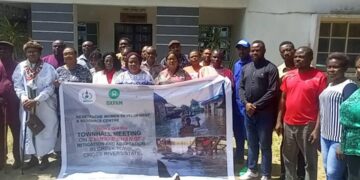A non-governmental organization, Kebetkache Women Development and Resource Centre, has called on fishermen in the Bakassi Peninsula to discontinue the use of premium motor spirit (PMS) for preserving crayfish and crabs. The group warned that this practice could lead to serious health risks, including cancer and other terminal illnesses.
Dr. Mrs. Emem Okon, the Executive Director of Kebetkache, issued this caution during a training workshop on climate change mitigation and adaptation strategies held in Calabar. Addressing 30 participants, she stressed that using petroleum products to preserve seafood is hazardous, posing a threat to both consumers and the environment.
The workshop, funded by Oxfam, aimed to educate participants from riverine communities across Cross River South on the impacts of climate change. It also sought to equip them with strategies to mitigate and adapt to these changes. Representatives from various fishing communities were brought together to discuss sustainable practices and environmental conservation.
Dr. Okon emphasized that if fishermen continue to use PMS for preservation, the health of consumers will be in jeopardy. “This method of preservation has significant health implications. The toxic chemicals in petroleum can contaminate the seafood, leading to severe health conditions,” she warned. She urged the fishermen to adopt safer and more sustainable preservation methods.
Concerns over the use of unapproved chemicals in fishing were echoed by Princess Bibiana Edem, a member of the Community Stakeholder Network (CSN) in Calabar South. She lamented that some fishermen resort to harmful practices, including using dangerous chemicals to catch smaller fish species. “These practices are among the social vices we must address. They not only endanger marine life but also threaten the livelihoods of coastal communities,” she stated.
At an interactive session following the workshop, Lawrence Peters, CEO of Sentient Farms Venture, advocated for the use of palm kernel shells instead of mangrove wood for smoking crayfish and cooking meals. “Using palm kernel shells is a sustainable alternative that reduces our reliance on mangroves,” he said, highlighting the need to preserve the mangrove ecosystem.
Peters expressed concern over the destruction of mangrove forests for firewood, describing it as a dangerous trend. “Cutting down mangroves exposes us to natural disasters that could be devastating,” he noted. “Mangroves play a critical role in protecting coastal communities from erosion and storms.”
He urged fishermen and locals to explore alternative fuels, such as briquettes, which burn efficiently without the environmental damage caused by cutting down mangroves. “If we continue to destroy these vital ecosystems, we risk losing species like periwinkles and crabs, which rely on mangrove roots for habitat. This loss would have far-reaching consequences,” he cautioned.
Earlier in the program, Godson Jim-Dorgu of Mac-Jim Foundation emphasized the importance of including women in the fight against climate change. He identified several causes of climate change, including the burning of fossil fuels, bush burning, and deforestation. “Women can play a key role in developing adaptation strategies. Their involvement is crucial for creating sustainable solutions,” he said.
The workshop concluded with a call for greater awareness and collaboration among communities to address environmental challenges. Participants were encouraged to adopt practices that promote sustainability, ensuring the long-term health of their ecosystems and communities.












